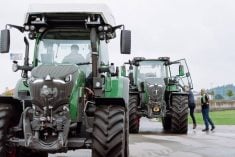Prairie farmers might feel flushed with victory now that Colombia is open to their crops and meat, but there’s no time to lie back on their laurels, say commodity group leaders.The gains from the small victory in getting free trade with Colombia could be reversed by massive losses if other countries get free trade with South Korea and Canada doesn’t.“It’s a market where we have everything to lose,” said Martin Lavoie, trade expert with Canada Pork International.“For me, the conclusion from the success with Colombia is to try harder with South Korea.”Canada’s export crop industries agree.“The grain side is very, very, very eager to see this move forward,” said Richard Phillips, executive director of Grain Growers of Canada.Farm export leaders say the danger to Canada does not come from current tariffs and import controls on Canadian crops and pork, which impede but do not block. The grave danger is the preferential access the European Union and the United States may soon have to the lucrative Korean market if they get free trade agreements before Canada does.Chile already has free trade with South Korea and its pork exports to that country have skyrocketed.U.S. president Barack Obama said during the G20 summit in Toronto that he plans to push the U.S.-South Korea FTA through Congress this year.“We’re just going to be wiped out of that market if we can’t get an FTA,” said Lavoie, noting that Korea is a major importer of Canadian pork.The sticking points for a Canada-South Korea FTA are beef and cars. South Korea won’t allow Canadian beef into its market and both South Korea and Canada impose restrictions on automobiles and auto parts.Canada’s struggling auto industry is worried about allowing Korea’s highly competitive cars and parts into Canada duty-free. South Korea has non-tariff barriers that block Canadian automotive products.Serious FTA negotiations have not been conducted since 2008, but federal international trade minister Peter Van Loan said Canada keeps talking to South Korean officials.In January this year, Van Loan and prime minister Stephen Harper raised the topic during a bilateral meeting during the World Economic Forum.“The negotiations with South Korea are well advanced, but the government of Canada is unwilling to move forward on a free trade agreement until we see provisions that are fair to the beef and auto sector,” said Van Loan in an e-mailed statement.Van Loan said the beef issue is a litmus test of South Korea’s willingness to trade fairly.“We highlighted the importance of restoring access for Canadian beef exports to the Korean market as a way to create an atmosphere conducive to moving forward in addressing the remaining challenges in the FTA negotiations,” said Van Loan.Canada has made a World Trade Organization complaint about South Korea blocking Canadian beef.Phillips, whose organization recently met with Canadian trade negotiators to push for a Korean deal, said the government may have to leave beef out of the FTA and resolve it through the WTO.“It may come down to that and that may be the direction we have to go at the end of the day,” said Phillips.“You can’t get everything in every deal. There may be other countries where they’re more sensitive to our grains and then beef will get the deal and the grains won’t.”Lavoie said he’s terrified of losing $125 million per year of Canadian pork exports to South Korea if other countries get a deal and Canada doesn’t.“It’s always a top five market for Canadian pork,” said Lavoie.“We all have an interest in resuming the talks as soon as possible.”
Read Also

Why feds imposed EV tariffs
Moe and Kinew have a fight on their hands when it comes to eliminating the EV tariff. Canada has to worry about pissing off the U.S. and Mexico and hundreds of thousands of auto workers.















